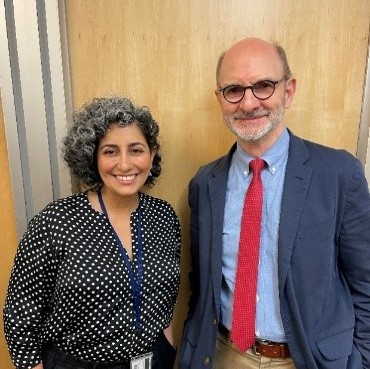The Office of Autoimmune Disease Research in the Office of Research on Women’s Health (OADR-ORWH) is pleased to introduce the NIH investigators who received Office of Autoimmune Disease Research Intramural Research Awards. These awards, which support high-priority autoimmune disease research occurring within NIH, represent a collaboration between OADR-ORWH and various NIH institutes known for their commitment to elucidating ways to predict, prevent, diagnose, and cure autoimmunity. Learn more about the awardees and their compelling work below.
Robert A. Colbert, M.D., Ph.D., and Sahar Lotfi-Emran, M.D., Ph.D.
The term axial spondyloarthritis (AxSpA) is used to describe a group of inflammatory and autoimmune joint and systemic diseases, characterized by inflammation of sites of tendon or ligament insertion into bone (entheses). AxSpA especially involves the joints of the spine and the sacroiliac joints, and progressive disease can lead to bony ankylosis. Despite advances in immunotherapy, there are no curative therapies, and many patients experience significant delays in diagnosis. The average diagnostic delay is 8.5 years, which leads to poor quality of life, worsening physical function, increased and permanent structural damage, and greater likelihood of disability. Another factor contributing to diagnostic delays is the historic assumption that these diseases predominantly affect young, White men. This results in even greater diagnostic delays in women, children, and people of color.
In the proposal “Identification of Pathogenic CD8+ T Cell Responses in Human Leukocyte Antigen-B27 Positive (HLA-B27+) Axial SpA,” supported by the Office of Autoimmune Disease Research in the Office of Research on Women’s Health (OADR-ORWH) and the National Institute of Arthritis and Musculoskeletal and Skin Diseases (NIAMS), researchers will use an established, inclusive, and well-phenotyped database and biorepository. The project seeks to identify CD8+ T cells whose clonal expansion implicates a pathogenic contribution to disease progression, particularly in individuals with HLA-B27, the strongest known risk gene for AxSpA. Results from this study may be used to develop testing to enable earlier diagnosis, tools to explore pathogenesis of disease, and, in the longer term, to develop novel therapeutics.
Award Recipients' Biographies

Robert A. Colbert, M.D., Ph.D., is the clinical director and a senior investigator in the Pediatric Translational Research Branch at NIAMS. He is certified in pediatric rheumatology by the American Board of Pediatrics. He has authored well over 100 papers, many of them on the role of HLA-B27 in spondylarthritis and has served as an investigator on a number of NIAMS- and other NIH-funded research studies.
Sahar Lotfi-Emran, M.D., Ph.D., is a physician-scientist and staff clinician at NIAMS, is trained clinically in rheumatology, and has a doctorate in immunology. She received her M.D. and Ph.D. from Virginia Commonwealth University and completed her internal medicine and rheumatology training in the physician-scientist training program at the University of Minnesota School of Medicine. Dr. Lotfi-Emran’s research has focused on immunopathologic mechanisms underlying autoimmune diseases with a particular focus on the role of tissue-resident CD8+ T cells, which lie at the intersection of local, tissue-specific immunity and the imprint of previous pathogen exposures such as viral infection.
Josephine Egan, M.D.
In type I diabetes (T1D), the immune system destroys the pancreatic beta cells that make insulin. The precise trigger of T1D is unknown, but it likely involves a background genetic predisposition with exposure and environmental factors that might trigger the disease. The National Institute on Aging (NIA) Diabetes Section in the Laboratory of Clinical Investigation (LCI) has found that endocannabinoids (EC), produced in the pancreatic islets, regulate insulin and glucagon secretion, modify the actions of incretin receptors, and serve as modulators of intra-islet inflammation because of their pro-inflammatory effects. ECs work though a specific EC receptor, cannabinoid receptor 1 (CB1R).
In the proposal “The Endogenous Cannabinoid System and Glucose Homeostasis,” supported by the Office of Autoimmune Disease Research in the Office of Research on Women’s Health (OADR-ORWH) and the NIA, researchers will study the hypothesis that the nullification of CB1R might slow autoimmune destruction and the death of beta cells downstream. Human islets will be studied to uncover how CB1R has pro-inflammatory effects, with a primary goal being to study these effects while islets are under inflammatory attack. CB1R may be a druggable target with potential to protect and build robustness of beta cells.
Award Recipient Biography

Josephine Egan, M.D., is the NIA clinical director and chief of the Diabetes Section in LCI at NIA where she oversees all clinical research for NIA’s intramural research program and initiates and brings to fruition all clinical protocols performed at NIA’s clinical site in Baltimore. She was instrumental in bringing glucagon-like peptide-1 (GLP-1) receptor agonists into clinical use. For more than three decades, Dr. Egan has been involved in clinical pharmacology and endocrinology research related to diabetes mellitus and the identification of new targets for its treatment. She is knowledgeable about islet isolation, islet morphology, islet cell types, mechanisms underlying insulin secretion, and regulation of insulin transcription and translation, and she uncovered the presence of insulin isoforms in humans. Additionally, she has expertise in adipokines and cytokines, their interactions with insulin secretion and action, and how they impact beta cell mitochondrial function and autophagy.
Marc Ferrer, Ph.D.
New approach methodologies (NAMs) are models that can test the toxicity of drugs and chemicals without animal testing. They are intended to more accurately model human biology and to complement, or in some cases, replace traditional research models. In vitro NAMs include biofabricated tissues and tissue chips that are developed to investigate molecular and cellular mechanisms underlying diseases and are used as predictive assay platforms for drug discovery and development. Developing NAMs for the study of autoimmune diseases is crucial for advancing autoimmune disease research. The 3-D Tissue Bioprinting Laboratory (3DTBL), an intramural laboratory at National Center for Advancing Translational Sciences (NCATS), has been on the cutting-edge of developing and validating engineered 3-D tissue models to accelerate the discovery of new medicines. The goals of NCATS’ 3DTBL are to:
- Use primary and stem cell–derived cells and tissue engineering methods to develop biofabricated 3-D tissue models for drug screening, with a focus on bioprinted tissue, tissue chips, and spheroids
- Develop disease-relevant phenotypic assays to enable the implementation of drug screens with engineered 3-D tissue models
- Use multiomics approaches (e.g., single cell ribonucleic acid [RNA] sequencing (scRNAseq), proteomics, metabolomics) to characterize and validate the engineered 3-D tissues
- Implement screens to assess pharmacological validation and clinical benchmarking of the engineered 3-D tissue models
In the proposal “Bioprinted Placenta Tissue Models to Investigate Dysregulation of Placental Function in Diabetic Pregnancies,” supported by the Office of Autoimmune Disease Research in the Office of Research on Women’s Health (OADR-ORWH) and NCATS, researchers will use a bioprinted vascularized human placenta tissue model to investigate the effects of high levels of glucose, insulin, and anti-insulin antibodies, mimicking diabetic conditions on the functions of the placenta. Furthermore, a multiomics analysis will be completed on the placenta model system, including scRNAseq, proteomics, and metabolomics, to investigate dysregulated molecular and cellular pathways and identify potential therapeutic targets. High levels of glucose, insulin, and anti-insulin antibodies in the mother during diabetic pregnancies can lead to severe medical complications. The research proposed enables production of personalized tissue models for precision medicine with diverse patient populations, including those with diabetic pregnancies.
Award Recipient Biography

Marc Ferrer, Ph.D., is the acting branch chief of the Early Translational Branch and director of the 3DTBL at NCATS. He graduated with a B.Sc. degree in organic chemistry from the University of Barcelona, Spain, and received his Ph.D. degree in biological chemistry from the University of Minnesota. He spent 10 years at Merck Research Laboratories, where he became director of assay development and high throughput screening. In 2010, he joined the NIH Chemical Genomics Center, working on the discovery of small molecule probes to study protein function. In the past 6 years, he has implemented the NCATS 3DTBL, a multidisciplinary group with the goal of creating and using 3-D bioengineered tissues for disease modeling and as predictive assay platforms for drug discovery and development. This proposal was conceived and is being implemented by 3DTBL postdoctoral fellows Cristina Antich Acedo, Ph.D., and Justine Noel, Ph.D., and by staff scientist, Min Jae Song, Ph.D.
Keisuke (Chris) Nagao, M.D., Ph.D.
Patients with drug-induced hypersensitivity syndrome (DiHS) have an increased prevalence of de novo onset of various autoimmune diseases, including autoimmune thyroiditis, myocarditis, type I diabetes, vitiligo, alopecia areata, and systemic lupus erythematosus. DiHS is a life-threatening form of a drug reaction that is notoriously difficult to manage clinically. The association with multiple autoimmune diseases suggests that DiHS is not a simple drug reaction, but that drug-induced loss of immunological tolerance may play a role. Thus, DiHS represents a unique opportunity to characterize cellular and molecular events that lead to the onset of autoimmune diseases.
Whereas studying patients with established autoimmune diseases provides valuable insight into ongoing disease processes, studying DiHS patients across acute to late phases provides a unique opportunity to explore cellular and molecular cascades that lead to autoimmunity. Interestingly, human herpesvirus-6B (HHV6B) undergoes reactivation in most DiHS cases, the significance of which remains undetermined. In the proposal “Exploring Mechanisms that Underlie Autoimmune Disease Development in Drug-Induced Hypersensitivity Syndrome,” supported by the Office of Autoimmune Disease Research in the Office of Research on Women’s Health (OADR-ORWH) and the National Institute of Arthritis and Musculoskeletal and Skin Diseases (NIAMS), researchers aim to dissect the interaction of HHV6B with immune cells and to understand how this virus might contribute to the breakdown of immunological tolerance, which results in the development of autoimmune diseases.
Award Recipient Biography

Keisuke (Chris) Nagao, M.D., Ph.D., currently heads the Cutaneous Leukocyte Biology Section at NIAMS. His research program includes basic and translational investigations on skin immunology and immune-mediated diseases. Dr. Nagao is an attending physician on the NIH Clinical Center’s Dermatology Consultation Service and is a former member of the Japanese Consensus Committee for Severe Cutaneous Adverse Reactions.
Suchitra Hourigan, M.D.
Crohn’s disease is a chronic recurring autoimmune disease in which inflammation may occur in any portion of the gastrointestinal tract from the mouth to the anus. Often this inflammation can cause strictures and fibrosis of the gastrointestinal tract, and the inflammatory process may also lead to microperforation and fistula formation. More than 500,000 Americans are affected by Crohn’s disease. Although the etiology of Crohn’s disease is multifactorial, genetic predisposition and gut microbiome imbalance likely play a role. There is a significant need to better understand Crohn’s disease pathogenesis to identify new therapeutic targets and biomarkers of disease activity.
In the proposal “Investigation into the Role of Endogenous Retroviruses in the Pathogenesis of Crohn’s Disease,” supported by the Office of Autoimmune Disease Research in the Office of Research on Women’s Health (OADR-ORWH) and the National Institute of Allergy and Infectious Diseases (NIAID), researchers will examine the role of endogenous retroviruses in Crohn’s disease using a novel human organoid model. This study aims to provide new insight into the pathogenesis of Crohn’s disease and to lay the foundation for investigation of specific endogenous retroviruses and related pathways as therapeutic targets for Crohn’s disease.
Award Recipient Biography

Suchitra (Suchi) Hourigan, M.D., was born in the United Kingdom and received her medical degree from the University of Oxford. She is a board-certified physician in pediatrics and pediatric gastroenterology, having completed her pediatric residency and pediatric gastroenterology fellowship training at the Johns Hopkins Hospital in Baltimore. She joined NIAID in 2021 as a Lasker clinical research scholar and an NIH distinguished scholar. As chief of the NIAID Clinical Microbiome Unit, her research focuses on early-life clinical microbiome interventions to improve future health and mitigate inflammatory diseases.
Lisa G. Rider, M.D., and Richard H. Scheuermann, Ph.D.
The idiopathic inflammatory myopathies (IIM), or myositis syndromes, are rare, female-predominant systemic autoimmune diseases that are characterized by chronic inflammation of muscle and associated with high morbidity. Frequently, the presence of unique autoantibodies in IIM can define subgroups with distinct clinical phenotypes and clinical outcomes. The unique autoantibodies also correlate with polymorphic immune response genes and certain environmental risk factors. IIMs are very costly, and they cause more physical disability than is caused by rheumatoid arthritis and other autoimmune rheumatic diseases.
Although findability, accessibility, interoperability, and reusability (FAIR) principles of data sharing and NIH-wide Common Data Elements (CDEs) have recently been developed to promote research data interoperability and aid researchers in sharing and combining datasets, no myositis-specific CDEs or common databases currently exist. In the proposal “Standardized Interoperable Data Collection for Myositis Research,” supported by the Office of Autoimmune Disease Research in the Office of Research on Women’s Health (OADR-ORWH) and the National Institute of Environmental Health Sciences (NIEHS), researchers will develop a Research Electronic Data Capture (REDCap) database of myositis core set measures, patient-reported outcome measures, key myositis assessment tools, and natural history/clinical trial study forms, which will all be shared with the myositis community. Furthermore, CDEs will be developed for these tools to support myositis research study interoperability using data science strategies that will serve as a paradigm for all autoimmune diseases. Through the creation of a large myositis REDCap database and CDE collection for myositis clinical research, the project aims to enhance the ability to conduct interoperable myositis clinical studies and therapeutic trials, enable the development of large myositis databases and registries, and accelerate collaborative research studies with data sharing.
Award Recipients' Biographies

Lisa G. Rider, M.D., is a physician-clinical scientist and pediatric rheumatologist, serving as head of the Environmental Autoimmunity Group in the NIEHS Clinical Research Branch at the NIH Clinical Center in Bethesda, Md. She leads a clinical and translational research program on the natural history, environmental and genetic risk factors, pathogenesis, outcome assessment, and therapy of systemic autoimmune diseases. Dr. Rider’s research group focuses on juvenile and adult myositis, a group of rare, female-predominant systemic autoimmune diseases characterized by chronic inflammation of muscle, which are associated with high morbidity and significant impact on women’s health. She has led national registries and international projects to understand phenotypes, risk factors, and outcomes for juvenile myositis, conducted several therapeutic trials of biologic therapies, developed outcome measures and response criteria for juvenile and adult myositis, and has been part of the leadership team that developed new myositis classification criteria. Dr. Rider is also a co-lead of the International Myositis Assessment and Clinical Studies (IMACS) Group, a consortium of myositis researchers.

Richard H. Scheuermann, Ph.D., has deep knowledge in molecular immunology and infectious disease, which he has applied toward the development of novel computational data mining methods and knowledge representation approaches, including the development of biomedical ontologies and their use in data mining, novel methods for the analysis of gene expression, protein network and flow cytometry data, and novel comparative genomics methods. These computational methods have been made available through several public database and analysis resources, including the Influenza Research Database (IRD), the Virus Pathogen Resource (ViPR), the Bacterial and Viral Bioinformatics Resource Center (BV-BRC), and the Immunology Database and Analysis Portal (ImmPort) supported by NIH. More recently, Dr. Scheuermann has focused on the development of novel artificial intelligence approaches for interpreting single cell genomics data of the human immune and nervous systems. As the National Library of Medicine’s (NLM’s) scientific director, he is responsible for setting scientific priorities and developing a comprehensive vision for NLM’s broad Intramural Research Program. Dr. Scheuermann guides NLM’s ongoing efforts to align NLM research priorities with the NLM Strategic Plan, the NIH research priorities, and the broader biomedical research community.
Xin Wei Wang, Ph.D., and Whitney L. Do, Ph.D.
Autoimmune hepatitis (AIH) is a chronic inflammatory disease of the liver characterized by elevated autoantibody levels and progressive liver injury. It may occur at any age, but it predominantly affects women, and it may rapidly progress to chronic liver disease, cirrhosis, and liver failure. Although the causes of AIH are unknown, an environmental trigger in a genetically predisposed individual is likely.
In the proposal “Exploring Viral Exposure History and Adaptive Immune Profiles in the Pathogenesis and Prognosis of Autoimmune Hepatitis,” supported by the Office of Autoimmune Disease Research in the Office of Research in Women’s Health (OADR-ORWH) and the National Cancer Institute (NCI), researchers aim to evaluate viral reactivity profiles in patients with AIH by using phage immunoprecipitation sequencing to examine more than 115,000 viral peptides annotated to all known viral strains. These profiles will be integrated with autoantibody reactivity profiles to evaluate sequence similarity and peptide reactivity associated with AIH as compared with other patient populations with liver disease and healthy control populations. The investigators will also examine the adaptive immune mechanisms that may contribute to disease onset and severity by evaluating human leukocyte antigen-genotype of AIH patients and the T cell/B cell repertoires of all patients. These profiles will be integrated with viral and self-antibody profiles using a machine learning network analysis to further characterize the associated pathways using a multiomics framework. Overall, this study will provide insight into the pathogenesis and the complex molecular mechanisms underlying AIH.
Award Recipients' Biographies

Xin Wei Wang, Ph.D., currently serves as deputy director and senior investigator at the NCI Center for Cancer Research (CCR). He is also co-director of the Multidisciplinary CCR Liver Cancer Program, acting co-chief of the CCR Laboratory of Human Carcinogenesis, and a member of the NIH Board of Scientific Directors. Dr. Wang is dedicated to improving the early detection, diagnosis, and treatment of liver cancer. His research focuses on the functional genomics of liver cancer and autoimmune hepatitis using genome-scale technologies and international collaborative initiatives. His lab conducts basic and translational research, building a global liver cancer database and employing integrated omics to understand tumor heterogeneity. Dr. Wang received his Ph.D. from New York University. He has coauthored more than 280 peer reviewed articles in top tier journals including Cell, Nature, Science, Cancer Cell, Nature Medicine, Nature Genetics, New England Journal of Medicine, Gastroenterology, Hepatology, and the Journal of Hepatology. His numerous awards include multiple NIH Director’s Awards, NCI Director’s Awards, and the Blue Faery Award. He is also on the editorial board of Cell & Bioscience and Hepatology, among others.

Whitney L. Do, Ph.D., is an Intramural Continuing Umbrella of Research Experiences (iCURE) postdoctoral fellow in the Laboratory of Human Carcinogenesis. She is a molecular epidemiologist and biostatistician specializing in identifying novel targets and biomarkers using multimolecular data to inform patient stratification and therapeutic strategies. During her postdoctoral training, her research has focused on using a new technology, phage immunoprecipitation sequencing, to explore risk factors and biomarkers of liver cancer and liver diseases such as autoimmune hepatitis.
Chuan Wu, M.D., Ph.D.
The pathogenesis of inflammatory bowel disease (IBD) involves genetic susceptibility leading to intolerance of dysregulated gut microflora, resulting in chronic inflammation due to environmental factors. Exploring the link between environmental factors and IBD may reveal the disease’s etiology and rising incidence. Functional gastrointestinal disorders are prevalent in females, who show genetic predispositions to IBD with distinct gastrointestinal symptoms, pain perception, and peristaltic movement. However, the mechanism behind female-biased IBD manifestations remains unclear.
Intestinal microbiota, especially B. fragilis, maintain intestinal homeostasis via interacting with the host. B. fragilis sphingolipids are crucial for intestinal immune tolerance, yet their impact on the epithelium barrier function is uncertain. Wu’s research group found that B. fragilis sphingolipids act as negative regulators for intestinal epithelial cell (IEC) expansion during inflammation via phosphatidylethanolamine-ceramide (PE-Cers), which inhibits IECs through Toll-like Receptor 4 (TLR4) signaling. Furthermore, PE-Cers significantly contribute to female-biased post-inflammatory hypersensitivity, promoting serotonin production and intestinal dysmotility.
In the proposal “Bacterial Sphingolipids Regulate Female-Biased Inflammation Associated Intestinal Dysmotility,” supported by the Office of Autoimmune Disease Research in the Office of Research in Women’s Health (OADR-ORWH) and the National Cancer Institute (NCI), researchers aim to elucidate how Bacteroides fragilis sphingolipids regulate intestinal inflammation and associated female-biased peristaltic dysfunction pertinent to IBD and irritable bowel syndrome. The study promises novel insights into microbe-host interactions crucial for IEC function. Increased awareness of female-related issues in IBD presentation and progression may enhance diagnostic and therapeutic strategies for women's wellbeing.
Award Recipient Biography

Chuan Wu, M.D., Ph.D., completed his M.D. at Shanghai Jiaotong University, School of Medicine. He undertook his doctoral research training at Muenster University, Germany, focusing on T cell migration during inflammation and autoimmunity. He completed his postdoctoral training at Brigham and Women’s Hospital at Harvard Medical School, where he studied transcriptional regulation for T cell differentiation. In 2016, Dr. Wu joined the faculty at Brigham and Women’s Hospital at Harvard Medical School as an assistant professor, and in 2017 he joined NCI as an Earl Stadtman investigator, redirecting his research to focus on how neuro-immune crosstalk regulates mucosal barrier function. His lab is interested in studying the mechanisms of how neuro-immune interactions contribute to body physiology and pathophysiology and in developing new therapies for immune-mediated diseases.
